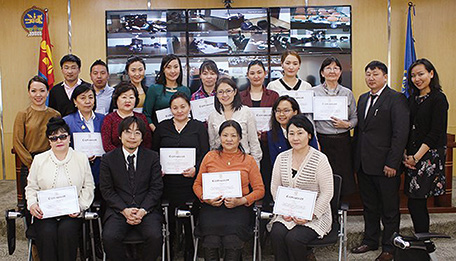(2) Assistance for Governance (Including Anti-Corruption Measures)
In parallel with economic development, developing countries have seen cases of corruption, including bribery of civil servants, which has become a factor impeding the sound economic growth of these countries. Equitable and stable management of socio-economic activities is the prerequisite of “quality growth.” Realizing an equitable and stable society requires governance assistance that includes implementation of anti-corruption measures in developing countries.
< Japan’s Efforts >
In FY2014, Japan contributed approximately $80,000 to the Crime Prevention and Criminal Justice Fund (CPCJF). This assistance contributed to strengthening the efforts to fight corruption, including through the creation of a handbook on international cooperation on cases of foreign public official bribery, intended for law enforcement agencies in Southeast Asian countries.
Through UNAFEI, MOJ held an International Training Course on the Criminal Justice Response to Corruption, on the theme of “Effective Measures to Prevent and Combat Corruption – Focusing on Identifying, Tracing, Freezing, Seizing, Confiscating and Recovering Proceeds of Corruption” for criminal justice professionals in developing countries, mainly in the Asia-Pacific region. This training course selects themes from the key issues of the United Nations Convention against Transnational Organized Crime (UNTOC) and the United Nations Convention against Corruption (UNCAC), and contributes to the sound development of the criminal justice system and the strengthening of cooperative relationships in each country.
As regards other efforts, Japan has held an annual seminar called Regional Seminar on Good Governance for Southeast Asian Countries since 2007, with the objective of supporting efforts to establish “rule of law” and “good governance” in Southeast Asian countries and contributing to human resources development in the area of criminal justice and corruption response. In 2014, a seminar was held in Kuala Lumpur, Malaysia on the theme of “Current Issues in the Investigation, Prosecution and Adjudication of Corruption Cases.”
Mongolia
The Project for Strengthening Mediation System (Phase II)
Technical Cooperation (April 2013 – Ongoing)

Participants in the seminar “Psychology of Domestic Relation Cases” (Photo: JICA)
After transitioning to a market economy in 1990, Mongolia has seen a rising number of disputes among its people resulting from the subsequent vitalization of economic activities. There has therefore been a growing need for the development of legislation to protect the rights of individuals and businesses, and for increasing the number of methods available for dispute resolution.
In particular, there is a growing need across Mongolia to resolve straightforward cases or matters that are suitable for settlement through discussion or mediation, such as small monetary claims and divorces. The fair and stable operation of society forms the basis for stable development and quality growth. The introduction of a mediation system has been an urgent need for achieving quick and reasonable dispute resolution that the people can accept.
Japan has assisted Mongolia with the establishment of legal systems and the training of mediation personnel in order to introduce a mediation system for general civil cases and family affairs cases since 2010. As a result, Mongolia enacted the Mediation Law and announced a plan to introduce a mediation system at courts of first instance nationwide in 2012. As Phase II of the Project for Strengthening Mediation System, Japan initiated assistance with the full-scale introduction and promotion of the mediation system in 2013.
Under this project, experts on mediation systems have been dispatched from Japan to Mongolia where they have held training sessions to develop mediation personnel nationwide. To date, under the watch of these experts 505 people have obtained credentials as authorized mediators. In addition, these newly licensed mediators have been invited to attend training in Japan in order to learn about Japan’s mediation system.
Japan has also aided the establishment of mediation offices at all 37 courts across Mongolia and supplied equipment, including computers and mediation tables, in an effort to introduce the mediation system across the entire country. On top of this, Japan has worked with Mongolia’s judicial branch to design the necessary mediation system and improve its implementation at the working level.
As a result, Mongolia now has permanent mediators and secretaries working at every court of first instance in the country. The system began in earnest in February 2014, and 6,427 cases were mediated between February and December 2014.
With the assistance of Japan, Mongolia is making progress on the development of the necessary judicial system for quality growth.
